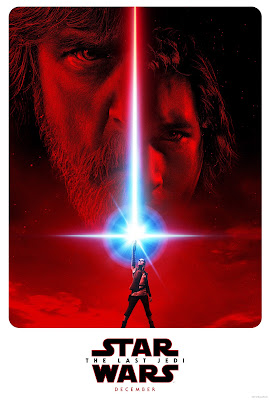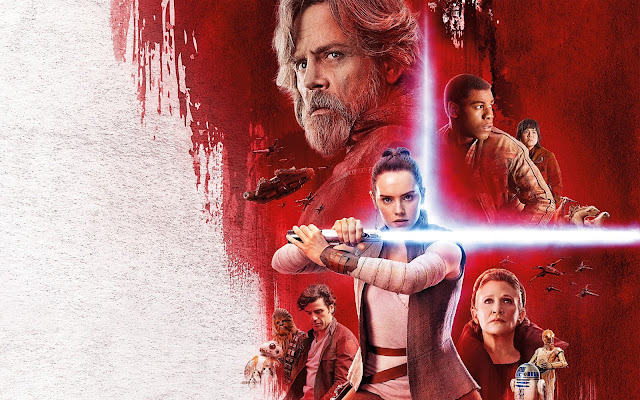In case there was any mystery about it (but probably not), I've loved everything Star Wars since before my age reached double digits. I grew up with the Original Trilogy, and then the first round of Special Edition releases on VHS -- the ones with those 30+ minute George Lucas documentaries that were, for some self-egrandizing reason, placed BEFORE the feature film. I've faithfully followed EU content since I found Michael Stackpole's The Bacta War (the fourth X-Wing novel) in 1997 while walking through a random book store with my dad, and my mind was completely blown that there were MORE STAR WARS STORIES than just what was on film. I suffered through the prequels when they were released with some enormous internal love/hate conflict, because a) MORE STAR WARS STORIES, but because b) bad acting and poor retconning. And the same could be said of my current predicament with Episodes VII and VIII: a) MORE STAR WARS STORIES, but b) not at all what I'd dared to hope for.
Those of us who come from decades of EU fandom are probably at a huge disadvantage compared to those who are new fans, or those who never delved into that treasury. Viewing these new movies with a more or less blank slate for post-ROTJ material is definitely a leg-up toward appreciating the new direction of the franchise. And even with my scruples, there's lots of stuff to like about these new movies. Granted, I had a lot less to complain about with The Force Awakens than I have with The Last Jedi, but for the most part, I've ridden the wave of excitement surrounding all of the new and upcoming Star Wars films.
Why? Because I've loved everything Star Wars since before my age reached double digits.
That said, what I forgot is that -- in this day and age -- you're not allowed to hold a critical opinion or you're automatically intolerant and shortsighted (even if you love the very thing you criticize). And you're especially not allowed to be critical of anything touting itself as progressive, and TLJ makes no bones about its attempt to radically challenge the established "rules" and tropes of a 40-year-old franchise. I'm exceptionally critical of TLJ because I think it was radical simply for the sake of being radical (my thoughts on the movie itself here). But I'm also exceptionally critical because I've loved everything Star Wars since before my age reached double digits, and when you love something, you truly want it to be the best it can possibly be. Unfortunately, the modern mindset can't comprehend how you can possibly say anything negative about anything deemed to be progress.
In that regard, this followup post really isn't about Star Wars movies. It's about Star Wars fandom. And I wouldn't feel the need to bring up the issue, except that media everywhere and even voices from within the franchise itself have backlashed against the backlash against TLJ (did you follow that sentence?). Fandom itself has been on trial in the weeks following the release of TLJ, because people no longer know how to disagree about things without drawing battle lines -- not even when it pertains to space operas about space wizards and laser swords. Joanna Robinson put it best in this great Vanity Fair article about the same topic: "We are, these days, a culture of extremes." Therefore, it's become virtually impossible for any kind of disagreement to be cordial. That's why articles upon articles are being published, and even the Alt-Right has been brought into the conversation about maliciously impacting reviews. A strong variety of passive aggressive memes are right now being rampantly shared by official pages and fans alike, criticizing the fanbase for claiming The Force Awakens was too much like the original trilogy, and then claiming The Last Jedi wasn't like them enough. In other words, casting the filmmakers and writers as victims: "They've done what you wanted, what more do you want?"
There will never be a perfect conclusion to this trilogy. I don't say that because I'm a crotchety EU fanboy, but because there is realistically no way any filmmaker can touch any kind of original material by addding onto it or changing it in some way, and not expect somebody somewhere to have contrary opinions. Not with the amount of time that has passed between the release of ROTJ and today, a time period in which so many stories and theories and ideas have become entrenched, and not everyone is capable of letting their imagination go so easily.
And to retreat to my intial point, that SHOULD be okay. We should all be allowed to have our own opinions and disagree on which movie is the best in the Star Wars universe without being cast as ungrateful children. I'm not sure why the fanbase (or subsets of the fanbase) should be labeled fickle for disliking the direction a particular franchise film went, especially when -- by virtue of writing more stories -- you are narrowing the scope of the myth and the mystery surrounding a story by locking it into a defined narrative with defined events and defined results. If you write the followup story, you inveitably take away theories and possibilities and cast the older material in new light. That is inevitably going to irritate some people who feel as though well enough should have been left alone, while simultaneously catapulting other people with fewer preconceived notions into new heights of imagination. The novels did the same thing back in 1978 when Alan Dean Foster's Splinter in the Mind's Eye first hit the shelves; Lucas' prequel trilogy did it again with The Phantom Menace in 1999; the Disney franchise is treading the same lonely paths of mixed reviews with The Force Awakens and The Last Jedi.
When you love something, you want it to be the best it can be. As someone who's loved everything Star Wars since before his age reached double digits, and as someone who enjoyed TFA but particularly disliked TLJ (maybe -- maybe -- almost as much as Attack of the Clones), I've also REALLY enjoyed discussing the particulars of this movie with both my friends who share my opinion and also those who completely disagreed with me. It's helped me to see things in a different light, to better articulate my qualms with the new brand of storytelling, and to talk about space wizards and laser swords with people who care as much about them as I do, albeit from different perspectives.
In sum, I'm not sure why the filmmakers and critics and media reps are so offended and disheartened that some fans strongly dislike their movie and not everyone is head-over-heels for it. I mean, there is that one idiot who started a petition to have The Last Jedi removed from the canon, so maybe it's all his fault? Furthermore, I really wish people who all love Star Wars could stop drawing lines in the sand of what constitutes "true fandom" and together embrace the pros and cons of the imperfect art that is storytelling. No franchise is flawless, and that's the beauty and integrity of what makes even space operas about wizards and laser swords ultimately about humanity.
Maybe The Last Jedi isn't the story I wanted, but it is the story I got. Perhaps Episode IX will collectively bring TFA and TLJ into a much stronger, much more cohesive focus. We won't know until we get there. And since I've loved everything Star Wars since before my age reached double digits, and because I want Star Wars to be the very best it can be... I'll wait with eager expectation.

